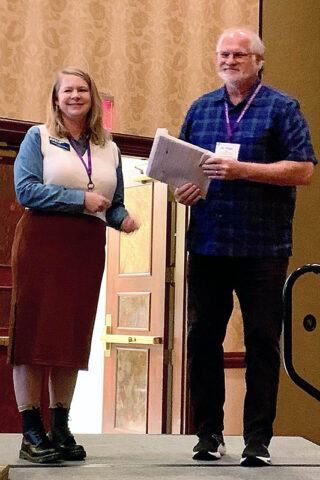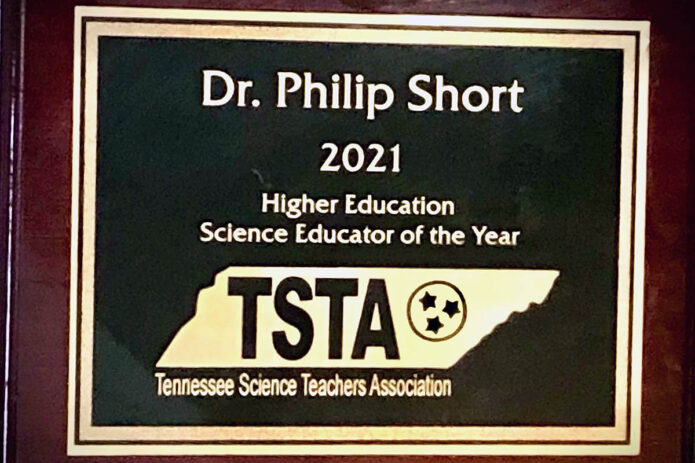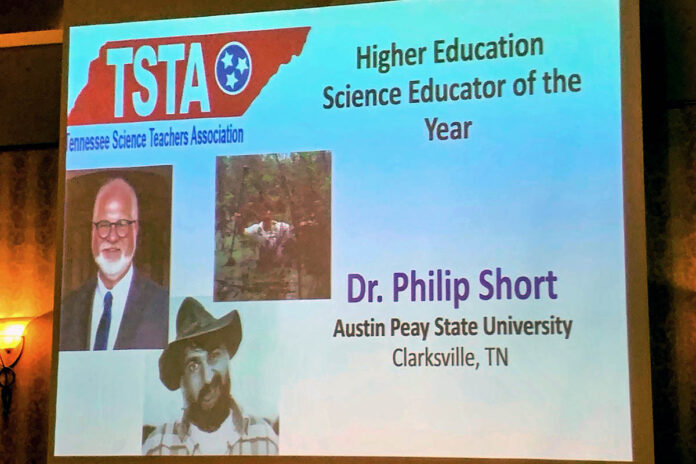 Clarksville, TN – An Austin Peay State University (APSU) education professor recently won the Tennessee Science Teachers Association Science Educator of the Year award in the higher education category.
Clarksville, TN – An Austin Peay State University (APSU) education professor recently won the Tennessee Science Teachers Association Science Educator of the Year award in the higher education category.
“The nomination alone was exceptionally meaningful coming from both colleges as I feel that need to work between them in my position,” Short said before adding with humility, “Awards are what they are, and there were many more deserving individuals across the state.”
Three Austin Peay State University professors collaborated on the nomination – Dr. John McConnell, chair of the Department of Educational Specialties, Dr. Karen Meisch, dean of the College of STEM, and Dr. Kallina Dunkle, associate dean of the College of STEM.

“They tricked me a little bit,” Short said. “John asked me a couple of times to get my statement of teaching philosophy down to a page (from three pages). He kept bugging me because, you know, other things come up, and so, finally, I got it to him.”
After that, Dunkle asked for more information for the nomination and confessed to Short that they were nominating him for the award. He found out a few weeks before the conference that he had won.
“It was a bit of a shock because before the pandemic, I was meeting about four times a year with my peers around the state who are directors at STEM centers,” Short said. “I know these folks, and there’s a lot of really good people out there in higher ed.
“The collective goal for all of these individuals is to achieve better science education grounded in constructivist instructional approaches with an inquiry-, problem-based framework.”
Lessons ‘Aligned to how Scientists do Science’
The teaching philosophy statement that Short shared with McConnell helps to define his goal for teaching science: “I would hope to hear each (student) whisper softly on their way out the door to new quests, ‘That was the most challenging class I have ever enjoyed.’”

The goal is that students walk away comfortable with the “unknowns” of what they have learned while having the confidence to pursue their curiosity.
“At the core of effective science instruction, behind and through all the policy changes, is the charge to teach science in a way more aligned to how scientists do science,” according to Short’s teaching philosophy statement.
“We want to take ourselves off the stage, put the students in the driver’s seat and develop opportunities for them to explore in a way that they have a performance basis for evaluating what they understand,” Short said. “In a way that is culturally responsive, community-relevant, where they can see why this is important.”
This concept also comes across in the background information he posted with his Austin Peay State University faculty profile: “My favorite moments continue to be those when people (young or old) make a discovery and allow themselves to change their view of the world.”
‘Better and More Science Teachers’
Short has more than two decades of experience teaching middle school and high school science and nearly two decades of experience teaching in higher education.
He credits his wife for guiding him on his path to Austin Peay State University, training future science teachers. She persuaded him to go for the STEM Center director job, which he started in 2016.
“Even though I’d been a teacher in secondary schools for a long time, this was very different for me,” he said. “I wouldn’t be sitting here talking to you without Dr. Donna Short.”
His new job placed him in the APSU Eriksson College of Education, but it was natural for him to get to know the people in the science buildings nearby, especially as a director of the STEM Center. That intercollege collaboration has benefitted Austin Peay in recent years with outreach events such as “Science Fridays,” driven by a state-funded grant to inspire science majors to become teachers.
“I have found that virtually everybody I talked to in the College of STEM, whether they understand the world of education that much, they all want better and more science teachers out there,” Short said – teachers who connect with students beyond textbooks, aligned to “how scientists do science.”



